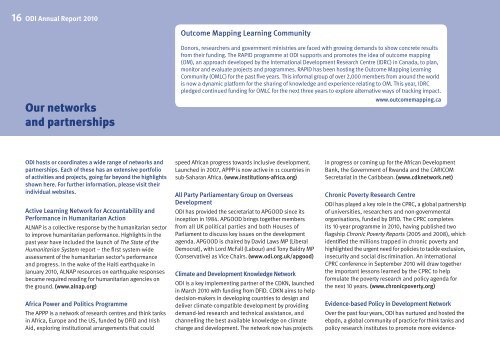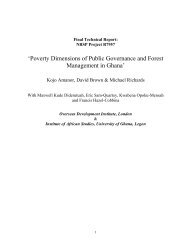ODI Annual Reports - Overseas Development Institute
ODI Annual Reports - Overseas Development Institute
ODI Annual Reports - Overseas Development Institute
Create successful ePaper yourself
Turn your PDF publications into a flip-book with our unique Google optimized e-Paper software.
16 <strong>ODI</strong> <strong>Annual</strong> Report 2010<br />
Outcome Mapping Learning Community<br />
Our networks<br />
and partnerships<br />
Donors, researchers and government ministries are faced with growing demands to show concrete results<br />
from their funding. The RAPID programme at <strong>ODI</strong> supports and promotes the idea of outcome mapping<br />
(OM), an approach developed by the International <strong>Development</strong> Research Centre (IDRC) in Canada, to plan,<br />
monitor and evaluate projects and programmes. RAPID has been hosting the Outcome Mapping Learning<br />
Community (OMLC) for the past five years. This informal group of over 2,000 members from around the world<br />
is now a dynamic platform for the sharing of knowledge and experience relating to OM. This year, IDRC<br />
pledged continued funding for OMLC for the next three years to explore alternative ways of tracking impact.<br />
www.outcomemapping.ca<br />
<strong>ODI</strong> hosts or coordinates a wide range of networks and<br />
partnerships. Each of these has an extensive portfolio<br />
of activities and projects, going far beyond the highlights<br />
shown here. For further information, please visit their<br />
individual websites.<br />
Active Learning Network for Accountability and<br />
Performance in Humanitarian Action<br />
ALNAP is a collective response by the humanitarian sector<br />
to improve humanitarian performance. Highlights in the<br />
past year have included the launch of The State of the<br />
Humanitarian System report – the first system-wide<br />
assessment of the humanitarian sector’s performance<br />
and progress. In the wake of the Haiti earthquake in<br />
January 2010, ALNAP resources on earthquake responses<br />
became required reading for humanitarian agencies on<br />
the ground. (www.alnap.org)<br />
Africa Power and Politics Programme<br />
The APPP is a network of research centres and think tanks<br />
in Africa, Europe and the US, funded by DFID and Irish<br />
Aid, exploring institutional arrangements that could<br />
speed African progress towards inclusive development.<br />
Launched in 2007, APPP is now active in 11 countries in<br />
sub-Saharan Africa. (www.institutions-africa.org)<br />
All Party Parliamentary Group on <strong>Overseas</strong><br />
<strong>Development</strong><br />
<strong>ODI</strong> has provided the secretariat to APGOOD since its<br />
inception in 1984. APGOOD brings together members<br />
from all UK political parties and both Houses of<br />
Parliament to discuss key issues on the development<br />
agenda. APGOOD is chaired by David Laws MP (Liberal<br />
Democrat), with Lord McFall (Labour) and Tony Baldry MP<br />
(Conservative) as Vice Chairs. (www.odi.org.uk/apgood)<br />
Climate and <strong>Development</strong> Knowledge Network<br />
<strong>ODI</strong> is a key implementing partner of the CDKN, launched<br />
in March 2010 with funding from DFID. CDKN aims to help<br />
decision-makers in developing countries to design and<br />
deliver climate-compatible development by providing<br />
demand-led research and technical assistance, and<br />
channelling the best available knowledge on climate<br />
change and development. The network now has projects<br />
in progress or coming up for the African <strong>Development</strong><br />
Bank, the Government of Rwanda and the CARICOM<br />
Secretariat in the Caribbean. (www.cdknetwork.net)<br />
Chronic Poverty Research Centre<br />
<strong>ODI</strong> has played a key role in the CPRC, a global partnership<br />
of universities, researchers and non-governmental<br />
organisations, funded by DFID. The CPRC completes<br />
its 10-year programme in 2010, having published two<br />
flagship Chronic Poverty <strong>Reports</strong> (2005 and 2008), which<br />
identified the millions trapped in chronic poverty and<br />
highlighted the urgent need for policies to tackle exclusion,<br />
insecurity and social discrimination. An international<br />
CPRC conference in September 2010 will draw together<br />
the important lessons learned by the CPRC to help<br />
formulate the poverty research and policy agenda for<br />
the next 10 years. (www.chronicpoverty.org)<br />
Evidence-based Policy in <strong>Development</strong> Network<br />
Over the past four years, <strong>ODI</strong> has nurtured and hosted the<br />
ebpdn, a global community of practice for think tanks and<br />
policy research institutes to promote more evidence-

















